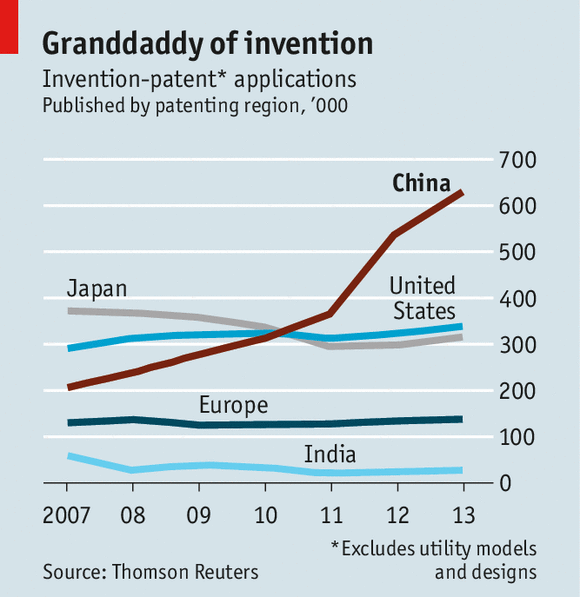

On December 13th a year and a half ago, The Economist, occasionally a critic of patent myths and Nemesis of patent lawyers' propagandistic/self-serving views, published the above figure, from the article "Patent fiction". It was one among several such articles which challenged the idea that patents and innovation are proxies/surrogates (we refuted this just a couple of days ago in relation to the US, where a new kind of patent was approved, heralding massive growth) and that China is suddenly super-innovative. We don't wish to write again what was written in 2014 (and beforehand) but only to highlight that it's widely recognised and well known that China's newfound love of patents oughtn't be mistaken for innovation. As The Economist put it (in relation to the figures/chart above): "The report highlights the astonishing increase in patents filed in the country. In 2010 Chinese firms filed roughly the same number of applications for “invention” patents (the most rigorous sort) as their counterparts in Japan and America. By 2013 the Chinese figure had nearly doubled even as the rates in the other two countries held steady (see chart)." The same thing happened in the US over the past decade, in spite of the economic meltdown; it doesn't say anything other than lust for patents growing or examination becoming a lot more lenient.
"Nowadays, much to our regret, what the EPO has to offer is under-qualified management (friends of Battistelli and their family members), a yellow union that's being 'sold' to the media, and bunk numbers which wrongly suggest that a rise in the number of patents means something (probably says the same as in China or the US)."This brings us back to the EPO because Battistelli, the clueless chief who quickly turned the once-respected Office into a laughing stock, seems to be blinded by numbers rather than quality. Classic ENA mentality. The Battistelli-leaning mini union (or minion [EN | ES]) has also become a laughing stock. As this comment put it as the weekend approached: "FFPE-EPO, the signatory of the MoU, has just elected a new committee. 5 candidates for 5 posts. And the winner, and new chairman, got 9 (nine) votes in total. And Battistelli seriously considers them a partner?? Laughable. 30 votes were cast. And yet BB insists that other unions must have 40% of ca. 7000 staff voting in strike ballots?? FFPE can barely muster a morning coffee round let alone a credible claim to representativeness."
"Maybe some female candidates could help or have they learned something from SUEPO," one person responded. "I WANT MY REPRESENTATIVES BACK!!!"
Nowadays, much to our regret, what the EPO has to offer is under-qualified management (friends of Battistelli and their family members), a yellow union that's being 'sold' to the media, and bunk numbers [1, 2, 3] which wrongly suggest that a rise in the number of patents means something (probably says the same as in China or the US). Some say there is not even a translation for Chinese patents (Mandarin) at the EPO, yet patent lawyers' sites say stuff like "China's Filings of European Patent Applications in 2015 increases 22.2%", echoing propaganda from China like this new article whose headline is "Invention patent applications rose 18.7% in 2015" ("invention patent" is a misleading term which conflates invention with filing). According to this new article from the British press (The Guardian), "Atieva worked quietly to perfect batteries and drivetrains, filing more than 100 patents and building battery packs for electric buses in China" (building and patenting are different things).
"One needs to decide if the importance of patenting outweighs the importance of life and the public interest."Not only the EPO is falling into this trap of patent maximalism (measuring the wrong thing, based on false premises). Here in the UK, lives of people seem to matter less than corporate profits, so the UK BioIndustry Association (BIA) gets involved in high-profile US cases, complaining about Sequenom v. Ariosa because an invalidation jeopardises high prices/monopoly. This decision is good for life saving, but it is not so good for billionaires who want to make billions annually, claiming to develop "life-saving medicines" while only offering such medicines to the rich. Medicine would be developed without lots of patents as well; a lot of such development is already subsidised by taxpayers anyway.
One needs to decide if the importance of patenting outweighs the importance of life and the public interest. If the patent 'industry' gets its way, there will be more patents, for the same reasons that the prison/penal industry (infamously in the US) wants more people behind bars, private healthcare wants more illness (i.e. more patients), and arms manufacturers want to create and deepen armed conflicts. ⬆